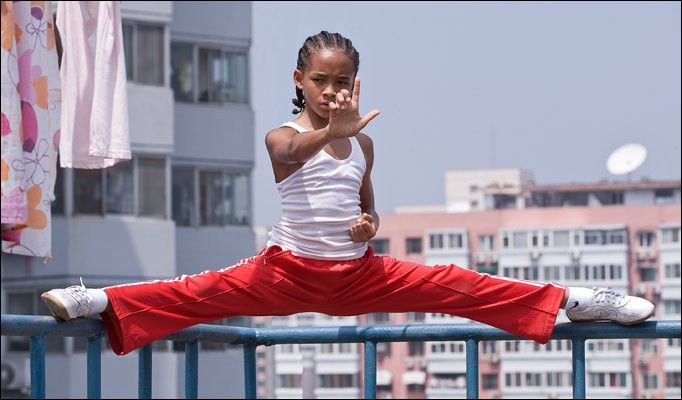The Karate Kid 2010

Introducing The Karate Kid (2010): A Modern Reimagining of a Classic Underdog Story
The Karate Kid (2010), directed by Harald Zwart, is a vibrant and heartfelt remake of the 1984 classic, reimagining the beloved coming-of-age tale for a new generation. Starring Jaden Smith, Jackie Chan, and Taraji P. Henson, this modern retelling swaps the original’s California setting for Beijing, China, and replaces karate with kung fu, offering a fresh cultural perspective while preserving the spirit of the underdog narrative. Produced by Will Smith and Jada Pinkett Smith through Overbrook Entertainment, the film blends martial arts action, emotional depth, and cultural exploration, earning praise for its performances and global appeal. Released on June 11, 2010, The Karate Kid became a commercial success and a cultural touchstone, inspiring young audiences with its message of resilience and self-discovery. This article provides a comprehensive introduction to the film, exploring its plot, themes, performances, production, and lasting impact.

Plot Summary
The Karate Kid (2010) follows 12-year-old Dre Parker (Jaden Smith), a Detroit native who moves to Beijing with his widowed mother, Sherry (Taraji P. Henson), after she accepts a job transfer. Struggling to adapt to a new country and culture, Dre faces bullying from a group of local teens led by Cheng (Zhenwei Wang), a skilled kung fu student. Feeling isolated and out of place, Dre finds solace in a budding friendship with Mei Ying (Wenwen Han), a violinist, but their connection draws further hostility from Cheng.
Dre’s life changes when he meets Mr. Han (Jackie Chan), the apartment complex’s maintenance man and a reclusive kung fu master. After Han intervenes during a brutal attack by Cheng’s gang, he agrees to train Dre for an upcoming kung fu tournament to confront his bullies honorably. Through rigorous training—famously including the “jacket on, jacket off” method—Dre learns discipline, resilience, and the deeper philosophy of kung fu. As he prepares for the tournament, Dre navigates cultural barriers, builds confidence, and strengthens his bond with Han, who reveals his own tragic past. The film culminates in an exhilarating tournament showdown, where Dre’s growth as a fighter and person shines, delivering a satisfying resolution to his journey.
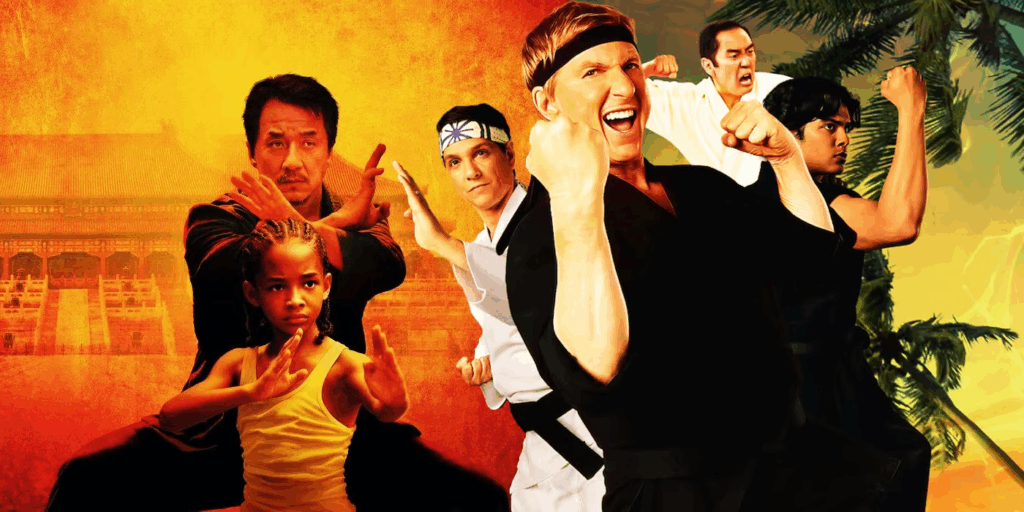
Themes and Symbolism
At its core, The Karate Kid (2010) is a story of personal growth, resilience, and cultural understanding. Dre’s relocation to Beijing symbolizes the universal experience of feeling like an outsider, making his journey relatable to audiences of all ages. The film emphasizes perseverance through adversity, as Dre transforms from a vulnerable newcomer to a confident young man, embodying the underdog spirit of the original.
Cultural adaptation is a central theme, with the Beijing setting offering a rich backdrop for exploring cross-cultural connections. Dre’s interactions with Mei Ying and Mr. Han highlight respect for Chinese traditions, from kung fu to family values, while addressing the challenges of navigating a new environment. The film subtly critiques bullying, showing how fear and insecurity drive Cheng’s aggression, and promotes empathy as a path to resolution.
Symbolically, the “jacket on, jacket off” training sequence represents discipline and the idea that small, repetitive actions build strength—both physical and mental. The Wudang Mountains, where Han takes Dre to train at a temple, symbolize spiritual growth, with the serene landscape contrasting the chaos of Dre’s urban struggles. Han’s backstory, involving a car accident that claimed his family, adds emotional depth, symbolizing redemption through mentorship.
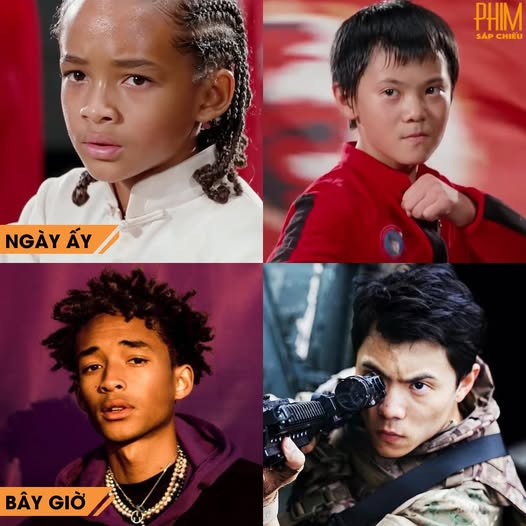
Cast and Performances
Jaden Smith delivers a charismatic and heartfelt performance as Dre, capturing the character’s vulnerability, defiance, and growth. At 11 years old during filming, Smith’s natural charm and athleticism—honed through months of martial arts training—make him a compelling lead. His emotional scenes, particularly with Chan and Henson, showcase a maturity beyond his years, earning him a Young Artist Award.
Jackie Chan redefines the mentor role as Mr. Han, trading the stoicism of Pat Morita’s Mr. Miyagi for a quieter, more introspective performance. Chan’s blend of humor, warmth, and understated grief makes Han a standout, with critics praising his “soulful” turn as a departure from his action-comedy roots. Taraji P. Henson shines as Sherry, bringing maternal strength and humor to a supporting role, grounding Dre’s journey with familial love.
Wenwen Han, as Mei Ying, adds a sweet, understated presence, with her chemistry with Smith fueling a tender subplot. Zhenwei Wang, a martial arts prodigy discovered by Chan, is menacing yet nuanced as Cheng, making the bully a formidable antagonist. The ensemble, including local Chinese actors, adds authenticity to the Beijing setting, enhancing the film’s cultural texture.
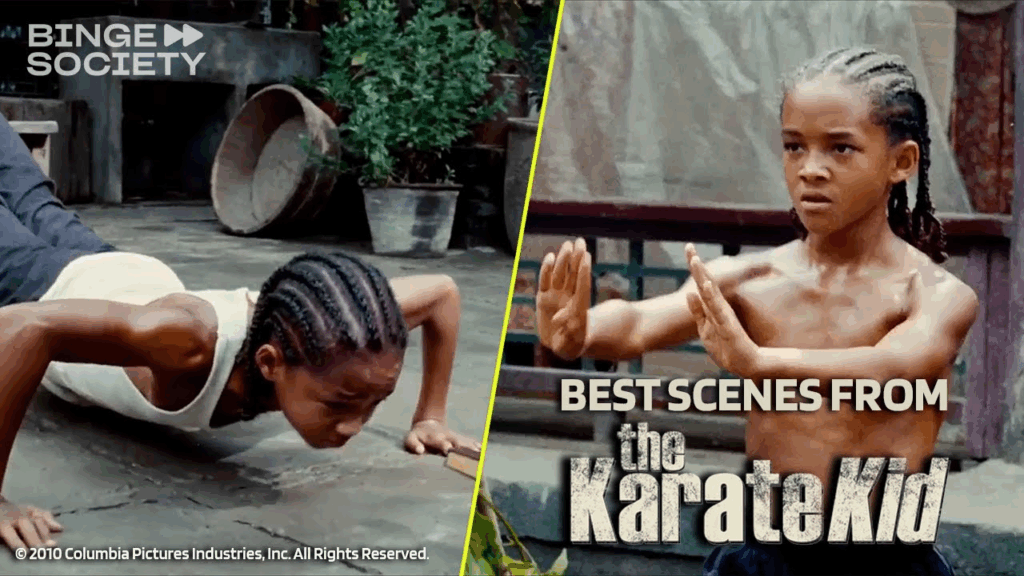
Direction and Cinematography
Directed by Harald Zwart (The Pink Panther 2), The Karate Kid balances action, drama, and coming-of-age elements with a polished, accessible style. Zwart’s direction emphasizes Dre’s emotional arc while showcasing the spectacle of kung fu, with training montages and tournament scenes that rival the original’s energy. The screenplay, written by Christopher Murphey and based on a story by Robert Mark Kamen (writer of the 1984 film), updates the narrative while preserving its core: a mentor-student bond and a triumph over adversity.
Cinematographer Roger Pratt (Harry Potter and the Chamber of Secrets) captures Beijing’s vibrancy, from bustling markets to the majestic Forbidden City and Great Wall. The Wudang Mountains sequence, filmed in Hunan Province, is a visual highlight, with sweeping vistas that evoke spiritual calm. The action choreography, overseen by Chan and stunt coordinator Wu Gang, is dynamic yet realistic, showcasing Smith’s training and Wang’s martial arts prowess. The tournament finale, with its intense fight sequences, is a thrilling payoff, blending practical stunts with minimal CGI.
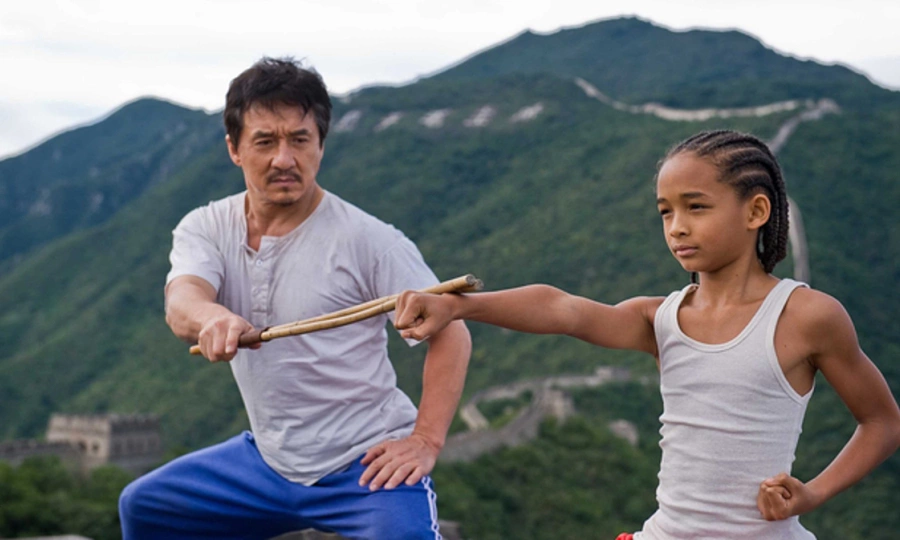
Music and Soundtrack
James Horner’s score infuses the film with emotional depth and cultural resonance, blending orchestral themes with Chinese instrumentation like the erhu. Tracks like “Journey to the Spiritual Mountain” elevate the training sequences, while the tournament music pulses with tension. The soundtrack features contemporary hits like “Never Say Never” by Justin Bieber featuring Jaden Smith, which became a chart-topping anthem and earned an MTV Movie Award nomination. Other songs, including Lady Gaga’s “Poker Face” and Flo Rida’s “Low,” add a youthful, modern vibe, grounding the film in 2010 pop culture.
Production and Development
Produced by Overbrook Entertainment, China Film Group, and Columbia Pictures, The Karate Kid (2010) had a budget of $40 million and was shot in Beijing and Hunan Province in 2009. The project was a passion for Will and Jada Pinkett Smith, who saw it as an opportunity to showcase their son Jaden’s talent while updating a classic for a global audience. Jackie Chan’s involvement brought authenticity to the kung fu elements, with his Beijing stunt team training Smith for months. The decision to set the film in China, rather than Japan or California, reflected a desire to embrace globalization and appeal to international markets, particularly China’s growing cinema audience.
The film faced minor controversy over its title, as purists argued that “kung fu” should replace “karate” to reflect the martial art used. Director Zwart and producer Will Smith defended the choice, citing the title’s brand recognition and the story’s universal appeal. The production also navigated challenges filming in China, including language barriers and cultural sensitivities, but the collaboration with China Film Group ensured authenticity and access to iconic locations.

Reception and Legacy
Released on June 11, 2010, The Karate Kid was a global hit, grossing over $359 million worldwide, making it one of the highest-grossing remakes of the decade. It earned an 66% approval rating on Rotten Tomatoes, with critics praising its heart, performances, and cultural vibrancy. Roger Ebert gave it three stars, calling it “a lovely and well-made film” that honors the original while standing on its own. Some critics noted pacing issues in the second act, but audiences embraced its emotional core and action.
The film’s success sparked discussions about a sequel, though plans stalled due to scheduling conflicts and Smith’s maturing career. Instead, its legacy lives on through its influence on young audiences and the Fast & Furious franchise, which adopted similar themes of family and resilience. On X, fans continue to celebrate the film, with posts like “Jaden and Jackie in Karate Kid 2010 is pure magic” reflecting its enduring appeal. The “jacket on, jacket off” scene has become a pop culture staple, parodied in shows like Family Guy and referenced in memes.
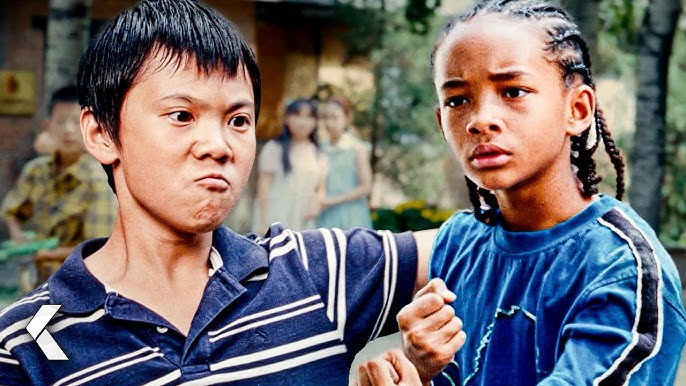
Cultural Impact
The Karate Kid (2010) bridged generational and cultural gaps, introducing the classic story to a new audience while honoring its roots. Its Beijing setting and focus on kung fu helped globalize the franchise, resonating with Asian audiences and showcasing China’s cultural heritage. The film’s emphasis on bullying and self-empowerment struck a chord with young viewers, with educators using it to spark discussions on resilience and cultural adaptation.
Jaden Smith’s performance launched his career, while Jackie Chan’s role as Mr. Han revitalized his image as a dramatic actor. The film’s diverse cast, including Taraji P. Henson and Chinese actors, added inclusivity to a traditionally Western story. Its fashion—Dre’s colorful streetwear and Mei Ying’s school uniform—inspired 2010s trends, while “Never Say Never” became an anthem for perseverance. The film’s success also highlighted China’s growing role in global cinema, paving the way for co-productions like Mulan (2020).

Why Watch The Karate Kid (2010)?
The Karate Kid (2010) is a must-watch for its heartfelt storytelling, thrilling action, and cultural richness. It’s a film that appeals to all ages—kids will love Dre’s journey, teens will relate to his struggles, and adults will appreciate the mentor-student bond and emotional depth. Jaden Smith’s charisma, Jackie Chan’s soulful performance, and the vibrant Beijing backdrop make it a standout remake that honors its predecessor while carving its own path.
Whether you’re a fan of martial arts, coming-of-age stories, or simply uplifting cinema, The Karate Kid delivers. It’s a reminder that with discipline and heart, anyone can overcome obstacles—no matter how far from home they are. So, put on your jacket, channel your inner kung fu master, and dive into this modern classic. It’s a knockout.
